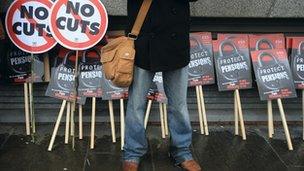Bark and bite from the public’s watchdog
- Published
- comments

Mr Black says councils often do not understand the implications of their budget cuts
Robert Black has spent the past 12 years as the watchdog that kept barking at the councillors and MSPs who control our public finances and steer our public services.
He now admits to having been disappointed at the "glacial pace" of change that his recommendations brought about. Perhaps his bark wasn't fierce enough.
Fresh into his retirement, and less constrained by the need to be diplomatic, measured and uncontroversial on the spending of Holyrood's billions, the bark now comes with added bite.
Robert Black says, bluntly, that Scotland's range of free public services is unsustainable.
He does so at a sensitive time. The political parties are battling fiercely over defining the location and terms of the new fault line, opened up by Labour's Johann Lamont last month, as she questioned whether services should be provided free to all, or scarce resources targeted by requiring the better off to make a financial contribution.
The former auditor general welcomes the asking of the question, noting that MSPs could not know how much more expensive free-for-all provision would become as demand and the demographic bulge both grow relentlessly.
The MSPs who made the decisions on free personal care, free concessions and free tuition fees were from all the main parties at different times, so it's not as political an observation as it might look in the current debate.
Parochial mindset
The speech to the David Hume Institute is intended to make for uncomfortable reading by MSPs. Black says they spend too long making (too often unnecessary) laws, and too little time asking whether billions of pounds of public funds are being effectively spent.
He also says they lack an understanding of how public services are delivered on the ground, contrasting this with the early days of the devolved parliament, when many new members came from council backgrounds and understood local conditions better.
Far from seeming a strength of the new parliament back then, the former councillors were more often derided as demonstrating its parochial mindset.
Yet there's also a message to councillors that their attempt to work in partnership with other agencies is mired in complexity - "like the wiring diagram from a nuclear submarine".
And council's failure to understand how voluntary and private sector organisations can provide services, such as social care, means they don't understand the implications of cutting their budgets now.
That raises an interesting question of whether a national agency is required to help contract for those services, with praise for the way in which the Scottish Futures Trust has used centrally-focussed expertise to help councils and health boards procure their capital projects.
Safe space
The former auditor general is also speaking on behalf of the public service leaders - the non-politician ones, that is - who are not allowed to speak out in public.
Having heard from quite a range of them, the strong, collective message from officialdom is one of frustration at a lack of political leadership (he's not specifying which layer of government) in openly explaining the tough choices facing public services and spending.
They're frustrated also at the speed at which innovation can be implemented. And with cuts being applied, they're finding that their organisations are losing knowledge and experience, without giving space to young talent moving up the career ladder.
Robert Black is calling for a "safe space" in which these conversations can be carried out, providing energy and drive to the necessary reforms, observing that debate in Scotland is now fragmented across numerous conferences and seminars.
If you're in government employment, the two year period leading up to a referendum on independence does not look like a safe space to do anything particularly risky or controversial.
But the message from Robert Black is a strong one; public services need reforming, and that process can't wait for a decision on the constitution.